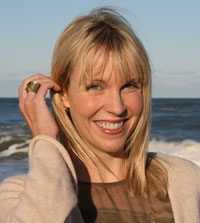 With her first novel, The Outer Banks House, Diann Ducharme took to heart the advice all writers hear: Write what you know. Though she and her family live west of Richmond in Goochland County, she has vacationed on the Outer Banks of North Carolina since she was three.
With her first novel, The Outer Banks House, Diann Ducharme took to heart the advice all writers hear: Write what you know. Though she and her family live west of Richmond in Goochland County, she has vacationed on the Outer Banks of North Carolina since she was three.
Diann’s agent, Byrd Leavell of the Waxman Literary Agency, and editor, Heather Proulx of Three Rivers Press, discussed the publication of this novel at the 2010 JRW conference. Jann Malone, former JRW board member, caught up with Diann in March 2010.
QUESTION 1: Why are you a James River Writers success story?
I have attended James River Writers conferences for the past five years. The many insightful sessions at the conference helped my writing immensely and perhaps more important, gave me the courage to keep writing in a sometimes difficult profession.
I met my agent Byrd Leavell at the conference after sending in the first five pages of my manuscript for the First Pages Critique, a conference session that involved an actor reading the pages and a panel of editors and agents critiquing them.
Byrd liked the writing and said that he’d like to see more, so I introduced myself after the session and I eventually — eight months later! — sent my completed manuscript to him in New York.
Full circle, four years later, I will be on a conference panel myself, sharing my story – from manuscript to agent to editor to publisher – and, hopefully, inspiring others.
QUESTION 2: What made you decide to tell the story you’ve written in The Outer Banks House?
I had heard that writers should write what they know, that a passion and a knowledge of a subject would shine through the writing. Well, The Outer Banks House is a product of my love of those fragile yet stubbornly enduring barrier islands.
I grew up going to the Outer Banks for one week every August with my family, and, eventually, my parents bought land in Kill Devil Hills and built a house. I spent three summers at the house during college and graduate school and earned my way with tips from waiting tables.
The Outer Banks House is primarily a romance, which always interests me in other novels. But it also covers other subjects that interest me as a woman and as a citizen of this world: class differences, gender inequities, education, and the enjoyment and preservation of natural resources.
Because I stuck to subjects that consumed my interests, it was actually a fun novel to write and sometimes didn’t even feel like actual work.
QUESTION 3: This is your first published novel. Is it the first thing you’ve written? What about other kinds of writing?
I was employed as a reporter and editor at a small local Henrico County newspaper for three years. After the birth of my first child, I was encouraged to write a column for the paper on the ups and downs of parenting as a stay-at-home mother. I enjoyed that challenge, meeting deadlines and writing about my own experiences. I earned an award from the Virginia Press Association.
But after about two years of that, I began to think about the possibility of writing fiction. Outside of creative writing in middle and high school, I’d never written fiction, even though I’d majored in English literature. Perhaps it was an escapist impulse in a challenging world of child-rearing.
I finally sat down, began to write down ideas on a legal pad. I imagined characters and plot lines. I began to research Outer Banks history and read about 50 books in between naptimes and at night. I was totally consumed by it.
My first attempts at actual writing were so bad I couldn’t believe it. I just kept pecking away at it though, until I got the words, the sentences, the paragraphs and the chapters the way that I wanted them.
QUESTION 4: What’s the hardest part about writing for you?
The hardest part of writing is the “getting it right.” By this I mean the crafting of the story: What are the characters meant to do? What is their destiny? There is only one possible answer for me, and the challenge is figuring it out. When I figure out their destiny, I can manage the plot as well, and I can tell them how to get to the end of their stories.
When the novel isn’t going the way that I think it should, it can be very frustrating for me. I think about the book every minute of the day, even when I’m not writing. That is the most difficult part of writing – the feeling of getting eaten alive by the story itself.
QUESTION 5: What are you working on now?
I just completed my second novel, tentatively titled Shanachie. It’s about Davey Abernathy, an uptight geneticist and longevity researcher who travels to an island off the western coast of Ireland to meet with and collect DNA samples from two elderly twin sisters, whose genes hold potential for his research.
He meets with a local woman – the great-granddaughter of one of the twins – who captivates him with old stories and myths and family lore.
One story describes a clan of the oldest people the world has ever heard of, and Davey must separate truth from reality in his ultimate quest for lifespan extension.

Back to Five Questions index page

